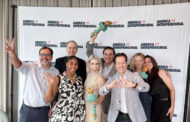Editor’s note: Rick Usher is a member of the Kansas City Startup Foundation’s policy committee, and Sarah Shipley is a board member for KCSF, the parent organization of Startland News. This piece was independently produced.
There’s a void of shared awareness between city government and the startup community, Rick Usher said.
That’s why government officials and leaders in the startup community are launching an event series starting April 14 to improve communication on key issues, said Usher, assistant city manager for entrepreneurship at the City of Kansas City, Missouri.
“It is clear that there is sometimes a gap in understanding between city government and the startup community in a number of areas,” said Usher, who serves as a member of the Kansas City Startup Foundation’s policy committee, a nonprofit that works to bolster the area entrepreneur community. “This event came out of discussions of the best ways to communicate new ideas and opinions effectively to our elected policymakers. The startup community has emerged very rapidly as an economic engine in the city and this event will help build the relationships necessary to move ideas to reality more efficiently.”
Startup and government leaders are working together to host the inaugural StartupKC Policy event 10 a.m., April 14 at Plexpod Westport Commons. The conversation hopes to not only bring those groups of people together but to also equip citizens with the tools to engage policymakers and officials. Attendees will learn how to find public meeting notes, how to join civic boards and action groups as well as how to approach policymakers.
The startup community must realize that it’s a growing constituency in Kansas City and that it must coherently develop a voice to effectively communicate with elected leaders, Usher said. That’s particularly important when regulatory challenges arise, such as those that cropped up with short-term rentals and on-demand ride-hailing with Uber and Lyft.
“While we learned a lot about the emerging business models and technologies that are disrupting legacy regulatory models, we did not learn a lot about how these models may or may not provide the same level of public safety or community benefit as current regulatory processes,” Usher said. “Basic issues of trust and safety transferring from government regulation to peer-to-peer models have been difficult to reconcile given the concerns of public safety organizations and neighborhood groups. What we learned is that a deeper conversation is necessary in order to build StartupKC community relationships outside of the crisis of the day and that is the purpose of this policymaking session.”
Addressing challenges with emerging tech are discussions that the startup community needs to participate in, Usher said.
“This will be a unique opportunity to discuss and develop best practices in policy-making engagement between the city and the startup community when new and potentially disruptive business models and technologies come into the KC market,” he said. “Participants should expect to come away with an understanding of the challenges and opportunities of working cooperatively with city government staff and elected policymakers on growing economic opportunity.”
Citizens and entrepreneurs have at times become apathetic when it comes to engaging with local government, but that needs to change if Kansas City is to realize its potential, said Sarah Shipley, chair of the Kansas City Startup Foundation board.
“I believe that social media has made people lazy when it comes to policy. It is important to go to meetings, read deeply into the issues that our city faces and to help come up with solutions that are proactive and serve the greater good,” Shipley said. “If you don’t have a seat at the table, you’re on the menu. … It is in everyone’s best interest to get involved with policy and to have more voices at the table to build policy for the future of Kansas City.”
Organizers are asking for attendees to RSVP here.





































